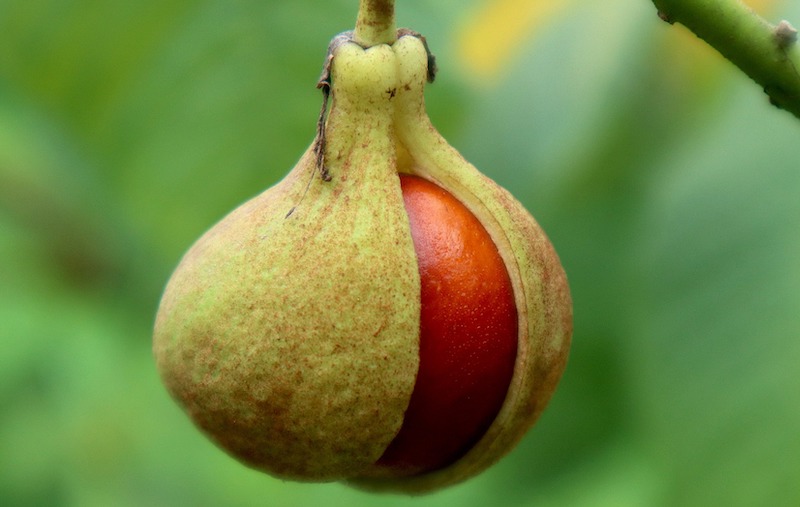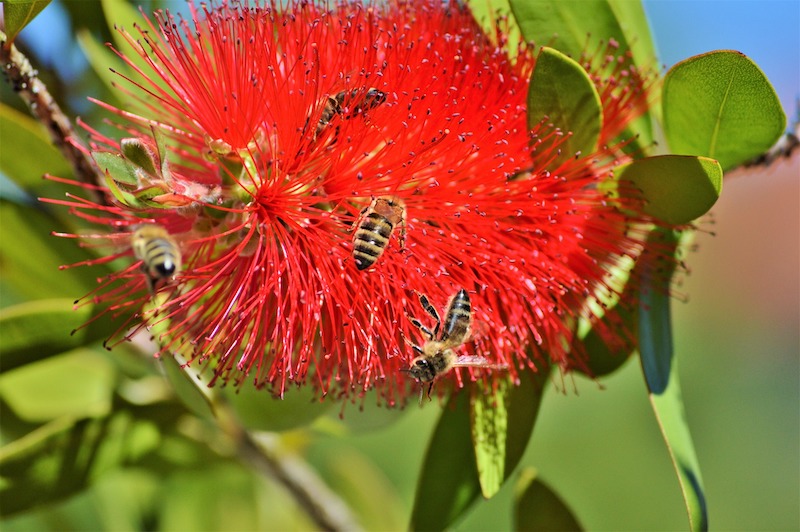Although there are three genera of shrubs that are commonly referred to as Bottlebrush, only one is considered to be a toxic plant for both humans and pets. All parts of Aesculus parviflora, Bottlebrush Buckeye, contain compounds that are toxic when ingested. Saponin aescin and glucose aesculin are present in the foliage, bark, and flowers, but are concentrated at the highest levels in the berry and seeds, making them taste very bitter.
A liquid soap can be made by boiling the seeds and berries, and flour was made by indigenous peoples in the southern United States by roasting and then soaking the nuts in a river stream for up to 5 days. The process was thought to leach out any harmful chemicals left in the seeds.

Is Bottlebrush Poisonous to Children?
The tropical Callistemon Bottlebrush is not known to be toxic to adults or children. No reactions occur from brushing against the foliage or flowers. The Bottlebrush Buckeye, on the other hand, is known to cause reactions if any part of the plant is ingested, although there is very little danger of skin irritation. If you suspect that your child has eaten any amount of Bottlebrush Buckeye, contact your healthcare provider or local poison control hotline as quickly as possible.
Is Bottlebrush Poisonous to Dogs?
Dogs who ingest large amounts of any plant will experience stomach upset including vomiting and/or diarrhea. Dogs who chew on plants should be kept away from Bottlebrush Buckeye and the seeds/nuts that it produces. The saponin inside is bitter for humans to taste but is not strong enough to deter a determined puppy or older adult dog.
The symptoms of poisoning in dogs include drooling, vomiting, muscle weakness, stumbling, and possibly seizures. Contact your veterinarian immediately if your dog has any of these symptoms.
Is Bottlebrush Poisonous to Cats?
As with dogs, the only genera of Bottlebrush shrub that is poisonous for cats is the Aesculus parviflora or Bottlebrush Buckeye. Cats that are allowed outdoor time may come into contact with this shrub even outside your garden. The symptoms appear from minutes to a few hours after ingestion and include vomiting, diarrhea, dilated pupils, lack of coordination, seizures, and coma. Immediate veterinarian care is required if you suspect that your cat has eaten any part of a Bottlebrush Buckeye shrub.

Is Bottlebrush Poisonous to Other Animals?
Other livestock and farm animals can be poisoned by eating the fallen seeds/nuts of Bottlebrush Buckeye and should not be allowed to graze in areas where the shrub grows. Symptoms can take minutes or hours to appear and include muscle spasms, diarrhea, vomiting, seizures, and lack of coordination.
Symptoms Of Bottlebrush Poisoning
Positive identification of your plants is imperative to determine the course of treatment in the case of a suspected plant poisoning. All parts of Aesculus parviflora, the Bottlebrush Buckeye shrub, are toxic to humans and animals. Other genera of Bottlebrush such as Callistemon spp. and Fothergilla spp. are considered safe to grow in the home garden.
Always check with your doctor or veterinarian for guidance if you suspect Bottlebrush poisoning.
Here are some common symptoms to look out for:
- Paralysis
- Muscle weakness
- Seizure
- Vomiting
- Dilated pupils
- Coma
Preventing Bottlebrush Poisoning
The best plan is to not grow the Aesculus parviflora in areas where children and animals frequent. This shrub grows well in a naturalized part of the garden on the edge of a large property where pets and children can be kept out. Never allow children to play games or pretend that inedible plant parts are food.
Pet Poison Helpline
If something were to happen to your furry friend, and you suspect that they are suffering from Bottlebrush poisoning, there is a poison control hotline to call for 24/7 vet advice. It is called the Pet Poison Hotline, and their phone number is (855) 764-7661.
Sources:
"Bottlebrush Buckeye." University of Tennessee - Forest Resources AgResearch and Education Center. taes.tennessee.edu
"Bottlebrush." American Society for the Prevention of Cruelty to Animals. aspca.org
 |
Author Robbin Small - Published 5-15-2023 |
